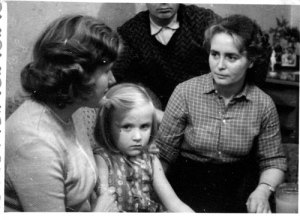Memories Denied (2005)
Original title: Tõrjutud mäletused
Huviinfo
FIRST THERE WAS A PHOTO OF MY MOTHER

Imbi and her mother Aino Paju.
When I look at the picture of my mother, I see sadness. The photo was taken in 1955, about a year after she had been released from Stalin’s forced labor camp. Mother’s melancholic look brings the reality of that time into the present day. The past lives on in her expression, and a perceptive observer can see her nightmarish experiences engraved on her face. My mother does not like to look at that photograph. She thinks the look on her face is too frightening. “You don’t know how hard it was,” says Mother. I failed to grasp the full meaning of my mother’s expression “frightening” until the beginning of the 21st century, when I began collecting materials for the documentary Memories Denied.
Throughout the Soviet occupation, the people who had survived the Siberian forced labor camps and persecutions either kept their painful memories to themselves or shared them only within the confines of their family, even then keeping the most horrifying details to themselves. Fearing renewed persecution and hoping to conceal the fact that they were marked, they remained silent. When they did speak, they were often met with indifference and a lack of understanding, making communication of these bitter experiences even more difficult. Social memory had suffered the systematic elimination of the actual past, a socially designed amnesia. This was the case throughout Central and Eastern Europe.
Imbi Paju - Memories Denied, http://imbipaju.wordpress.com/ (7.03.2013).
I was born five years after Mother’s release from prison camp. At the age of forty, I began making a documentary film entitled Memories Denied about the story of my mother and her twin sister. I wanted something to endure from my mother’s life; something that would create a new sense of continuity. I believe that any kind of pain that is recreated on film, in a book, in a work of art, changes the source of its meaning, creating a new event. The screen is like a mirror in which the viewer does not directly see oneself; what the viewer sees gives birth to a feeling, which in turn creates an experience, an experience through which the viewer becomes a participant in the process of laying open this pain. And this pain often has universal significance.
As a child, I often awoke to hear my mother crying out for help as she struggled in nightmares. Her dreams were of Stalin’s forced labor camps and the Soviet soldiers who threatened her life. In those dreams, she was never able to return home to her mother. In my childhood, those dreams of my mother’s caused me great distress. The script of this story began taking shape in those childhood years. The forced labor camps and death camps filtered into my subconscious through my mother’s dreams.
This story is the untold story of all Estonian society, a story of sadness, arbitrary power, and images of violence – a puzzle. Many different feelings flow from mother to child; at that time, I did not know that my mother was suffering from something called remembering.
(From the film Memories Denied)
Quotations:
“Imbi Paju’s book opens doors onto dark rooms.”
Edward Lucas, author of The New Cold War.
“By describing the fate of her mother – arrested, imprisoned, deported to the Gulag as a young woman – Imbi Paju has, in effect, told the story of an entire nation. Widely admired in her native Estonia and elsewhere, Memories Denied could bring that country’s history alive for many others too.”
Anne Applebaum, Author of Gulag
“Memories Denied is without question one of the books that will contribute to both the knowledge and the understanding of what our Estonian sister nation and the other nations that fell under the communistic oppression after the Second World War were confronted with.”
Dag Hartelius, Ambassador of Sweden in Estonia, Svenska Dagbladet
“One of the best books on the history of Estonia and the fate of its people.”
Stefan Brunow, Arts and Culture Journalist, Tv YleFem/Finland
“Memories Denied is an impressive and essential work. An important contribution to cultural memory in Europe!”
-Prof. Peter Hanenberg
Imbi Paju - Memories Denied, http://imbipaju.wordpress.com/ (7.03.2013).










